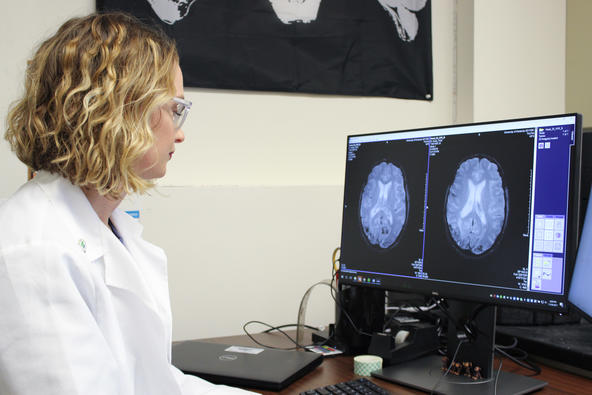Combining Passions for Science and Policy

When Alex Helman began her search for a doctoral program that would allow her to further her knowledge of neuroscience and conduct research on Alzheimer’s disease, she was surprised to add the University of Kentucky to her list.
Initially, she was shocked by the number of people doing research on Alzheimer’s disease, but when she looked more, she found that the UK Sanders-Brown Center on Aging’s designation as an Alzheimer’s Disease Center by the National Institutes of Health provided numerous opportunities to work on research to advance the prevention and treatment of Alzheimer’s disease.
After her visit to campus, she learned many of the faculty conducting research were eager to include students as research assistants and there were abundant opportunities to do the work she loved. “I left my visit thinking ‘Oh my gosh, I want to go to UK.’”
Helman is now a doctoral candidate in the Department of Molecular and Cellular Biochemistry in the University of Kentucky College of Medicine. She completed a year of lab rotation and then joined the research staff of Paul Murphy, associate professor in the UK College of Medicine Department of Molecular and Cellular Biochemistry.
Helman currently works on a project in the lab of Elizabeth Head, professor in the UK College of Medicine Department of Pharmacology and Nutritional Sciences, where she’s part of a team conducting a longitudinal study to examine the development of Alzheimer’s disease among people with Down Syndrome.
“I’ve always been interested in a range of policy issues but my primary passion has always been science and for a long time I kept those two things separate,” Helman said. But, as she paid more attention to politics she realized the fields of science and politics were more connected than she thought and she had a role to play in both.
For the past two and a half years, Helman has served the Alzheimer’s Association as a liaison between the organization and Congressman Andy Barr’s office in Lexington. Helman began her advocacy work as a congressional team member, tasked with working with an assigned legislator to advocate for the policy goals of the organization. For the past year and a half, Helman has been leading these efforts as an ambassador who leads a team of advocates.
This spring, Helman will take her passions for policy and science to the next level as a Christine Mirzayan Science & Technology Policy Graduate Fellow. This fellowship program, offered by the National Academies of Sciences, Engineering and Medicine, will provide Helman with the opportunity to work in Washington D.C. for 12 weeks to learn more about science policy. Helman chose to apply to serve on the Committee on Women in Science, Engineering and Medicine to learn more about policies that improve the retention of women in science, technology, engineering and medicine (STEM) fields.
Helman will defend her doctoral dissertation this summer and earn her Ph.D. After which, she hopes to work for the federal government doing science policy work, possibly in workforce policy or scientific advising through the American Association for the Advancement of Science policy fellowship.
“If we stay in our labs and don’t advocate for ourselves it’s easy to be forgotten. Your data doesn't speak for itself, you speak for your data." Helman said. "You can do your work and it’s important to continue to be as unbiased as possible, but our data means nothing if no one values and understands it.”
Credits
Text by Olivia Ramirez (UK Public Relations and Marketing).
